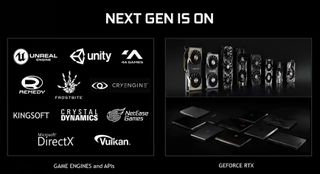NVIDIA partners with Unity and Unreal to integrate ray tracing tech
Get ready to see ray tracing in a whole lot of upcoming games this year.

NVIDIA's ray tracing tech hasn't gotten off to a great start, with just a few titles offering support for the technology. That's all set to change, as NVIDIA has announced at GDC that it is teaming up with Unity and Unreal to integrate its ray tracing technology into both game engines. That's a major win for the chip vendor as it tries to make ray tracing more accessible to developers.
Nearly 90% of PC games are developed on either Unity or Unreal, so the fact that ray tracing tech is baked into the game engines makes it that much easier for game studios to leverage the technology. NVIDIA mentioned that its goal was to minimize the amount of time and effort it requires to build games that offer real-time ray tracing, and integrating the technology into two of the world's largest game engines goes some way toward alleviating those issues.
Furthermore, the low uptick of ray tracing meant that sales of NVIDIA's RTX cards have been lukewarm to say the least. With Unity and Unreal throwing their weight behind the technology, that should change soon. In fact, NVIDIA CEO Jensen Huang foreshadowed the announcement last month in an earnings call,
Probably one of the biggest stories that came out just last week is Unreal engine and Unity, both of the game engines, are going to incorporate RTX and ray tracing technology in the engine itself.
Ray tracing leads to much more realistic visuals in games as it simulates light bouncing off various surfaces. But the downside is that doing so requires a lot of processing power, and this is why RTX cards have dedicated cores to facilitate real-time ray tracing.
Unreal Engine 4.22 with ray tracing is in preview right now, and we should know more details about a final release shortly. Unity will offer "production-focused" real-time ray tracing integration in a new build that will go live on April 4.
What is NVIDIA ray tracing and DLSS?
Get the Windows Central Newsletter
All the latest news, reviews, and guides for Windows and Xbox diehards.

Harish Jonnalagadda is a Senior Editor overseeing Asia for Android Central, Windows Central's sister site. When not reviewing phones, he's testing PC hardware, including video cards, motherboards, gaming accessories, and keyboards.
